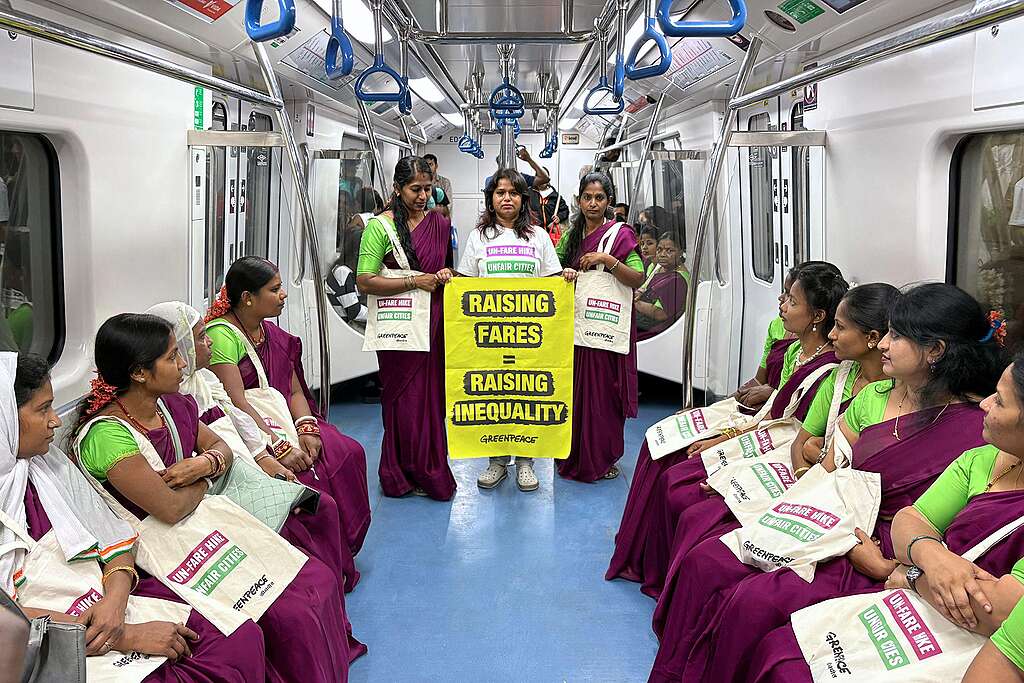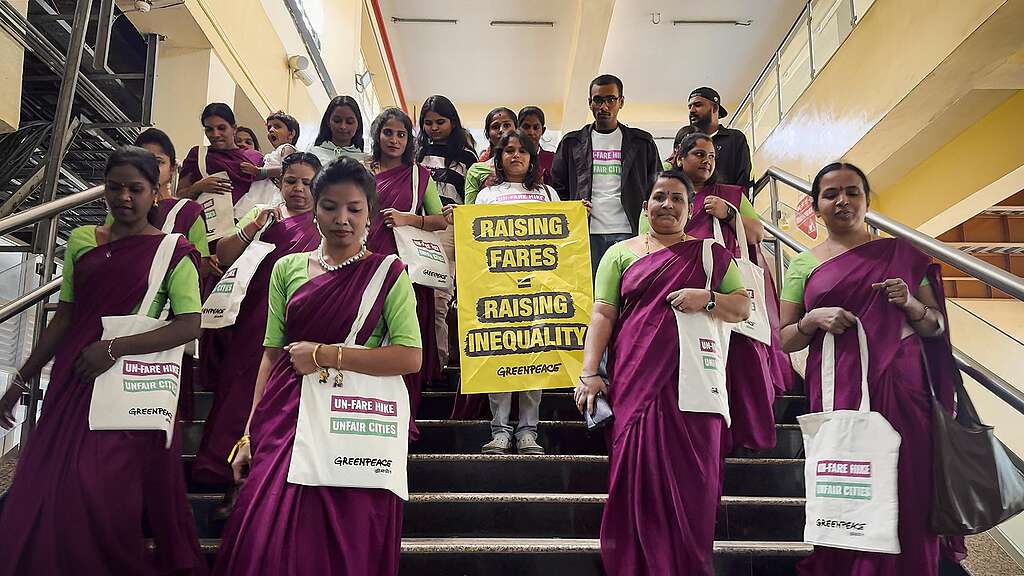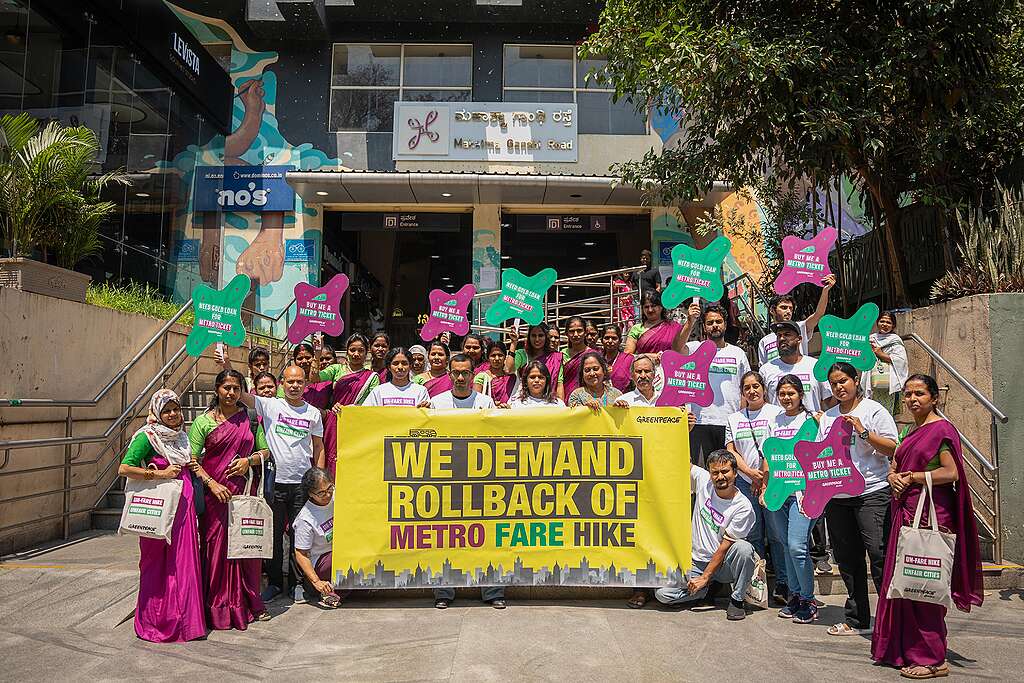Bengaluru, India. 9th March 2025 – A month after the metro hike on 9th February, commuters and citizens in Bengaluru came together, inside the city’s metro today, calling for an immediate rollback of the recent fare hike. The demonstration highlighted growing public concern over affordable and accessible public transport, urging authorities to take action. Bengaluru Metro ridership dropped 13% overall post fare hike, with a sharp 20% drop in February alone, signalling affordability concerns.

A recent survey conducted by Greenpeace India after the metro fare hike in February 2025, highlights that Bengaluru Metro fare hike has significantly burdened low and middle income groups, students and working professionals as 72.9% of respondents said that their transport costs now exceeds or equal their one-time meal expense. Additionally, women, who depend on public transport more than men, have been disproportionately affected, further limiting their mobility and safety. The fare hike makes daily travel a financial burden for students and working professionals who rely on public transport.
Key finding of the survey:
- 40.4% of respondents use the metro as their primary mode of transport.
- 62.9% rely on Public transport (metro & buses combined)
- 73.4% spent 50-150 Rs daily on transport.
- 68% of respondents stated that the fare hike made metro travel expensive.
- 75.4% cut down on non-essential travel due to rising costs.
- 38.2% women have reduced their non essential travel due to metro fare hike in Bangalore
- A majority believe the fare hike is unjust and harms urban mobility.
- Many commuters demand a rollback of the fare hike to restore affordability.
Click the link to find the detailed survey report.

Greenpeace India urged BMRCL to roll back the Namma Metro fare hike in a letter and called on the government to prioritize affordable, gender-sensitive and disability-friendly public transport over shifting costs onto commuters. The fare hike has led to several changes in the lives of people, with parents looking to shift schools and people across income groups shifting to other modes of transport.
Bengaluru, already battling severe climate impacts like air pollution and heat waves and is vulnerable to high degree of climate change, needs greater investment in efficient public transit to tackle congestion and build climate resilience. Instead of fare hikes, measures like congestion charges and stricter parking policies can help generate revenue while curbing excessive car use. The car centric infrastructure such as the proposed ₹19,000 crore tunnel project will only offer a temporary fix and divert critical funds from sustainable transport solutions.
Aakiz Farooq, Campaigner, Greenpeace India: “Public transport should serve the people, not profit-driven motives. Bengaluru’s metro fare hike further burdens commuters already struggling with affordability and accessibility. With our cities facing severe environmental crises, investing in affordable and efficient mass transit is essential. There is a need for a dedicated public transport budget and both state and central governments must step up to strengthen the mass transit system. The Government should introduce Climate Tickets to incentivise public transport for commuters ”
Individuals with bold protest messages – Un-Fare Hike, Unfair Cities, gathered at Kengeri metro station in the morning, where they boarded a metro train bound for MG Road while carrying placards and banners advocating for fair fares. Their silent yet powerful visual demonstration represented the burden that fare hikes place on ordinary citizens, amplifying the public outcry and reinforcing the need for affordable, accessible, and sustainable urban mobility.
With each fare increase, Bengaluru’s metro—once envisioned as an affordable and inclusive public service—has become a system of exclusion, disproportionately affecting students, IT workers, informal workers, women, and lower-income groups, office-goers among others. Many commuters are now forced to switch to costlier, more polluting alternatives, increasing road congestion and air pollution. Vehicular pollution ranks as the second largest and a highly consistent source of PM10 and PM2.5 particulate matter. This pollution poses a serious threat to citizen health and is a key driver of climate change.
Irene Ann Kuttichira, Metro Commuter “As a daily commuter, I feel every fare hike hits hard. Many depend on the metro for work or college, and higher fares make commuting unaffordable and leave us with tough choices. We are demanding a transport system that serves everyone—not just those who can afford to pay more.”

About Greenpeace India
Greenpeace India is an independent environmental organization that campaigns for sustainable and equitable solutions to climate change, air pollution, and urban mobility issues. Through grassroots activism and policy advocacy, Greenpeace India seeks to make cities more liveable, breathable, and accessible for all.
For more photos and videos click here
For media inquiries, please contact:
Aakiz Farooq: [email protected]
Nibedita Saha: [email protected]
Nimisha Agarwal: [email protected]
Website: www.greenpeace.org/india
